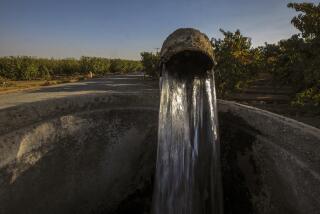Water Meter Bill Advances : Drought: State Senate approves measure requiring devices on all new homes. It would not force their use.
- Share via
SACRAMENTO — Moving to require water meters in Sacramento and dozens of other communities for the first time, the Senate approved legislation Thursday mandating that all new homes in California be equipped with meters.
The legislation passed easily on a 25-3 vote, in part because the bill is so weak it does not require that the meters actually be operating.
For supporters of water meters, however, the bill is a first step toward requiring residents of Sacramento and 40 other communities around the state to become accountable for the water they use.
“Without a meter there is no knowing how much water you consume,” said Senate President Pro Tem David A. Roberti (D-Los Angeles) in urging his colleagues to vote for the bill. “Conserving water is everybody’s business, whether you live in an area of water riches or in an area of water scarcity.”
Sacramento, located at the confluence of the American and Sacramento rivers, has long fought attempts to impose metering on its cheap and plentiful water supply. In previous years, even the weakest of water meter legislation has been defeated.
With the fifth year of drought, however, water meter advocates are finally making progress in the Legislature. With its approval by the Senate, the bill by Sen. Daniel E. Boatwright (D-Concord) goes to the Assembly, where it is expected to pass. Gov. Pete Wilson has indicated his willingness to sign legislation requiring water meters.
Boatwright’s bill--apparently the toughest he could negotiate--would require that water meters be installed in all homes built after Jan. 1, 1992, but would let local authorities decide whether to order their use. Existing homes and agricultural water users would be exempt from the measure.
The city of Sacramento, the largest of the unmetered communities, did not oppose the legislation, largely because the bill does not require the costly installation of meters on existing homes.
Even so, Sen. Leroy Greene (D-Carmichael), whose district includes much of the unmetered area, argued that installing meters in Sacramento will save far less water than if agriculture was forced to conserve more.
“Are we to be penalized because there is a surplus of water in this area? Is that it?” Greene asked. “What will anyone else gain?”
Like others in Sacramento, Greene argued that much of the area’s water is recycled and sent down the Sacramento River to be used again by farmers and urban dwellers farther south.
“What happens when you flush your toilet (in Sacramento)?” he asked his colleagues. “It goes over to the sewage treatment plant, solids are removed, water is reclaimed, back to the river and south it goes for reuse. We recycle.”
Supporters of the legislation, however, argued that water meters are the only way officials can impose a mandatory conservation program. Even without rationing, they said, residents who have meters become more conscious of their water use and do more to conserve.
Several senators noted the disparity between living in their districts--where they face serious water shortages--and staying in the capital, where they can use water without restriction.
“Just about all of us live in two homes,” Roberti said. “Those of us who live in homes either down south or in the Bay Area with water meters have to know that you watch the meter.”
At the same time, Roberti agreed that the state should require agriculture, by far the biggest user of water in California, to conserve more. While homes use about 9% and businesses 6%, agriculture consumes 85% of the state’s water supply.
“This Legislature has done precious little to ask agriculture to engage in its fair share of water conservation,” Roberti said.
Boatwright pointed out that of major cities in California, only Sacramento increased its average per capita water usage in 1990. Residents of every other city cut back.
“In California, we have to pull together to save water,” Boatwright said. “This is the best way I know of conserving water in California.”
More to Read
Get the L.A. Times Politics newsletter
Deeply reported insights into legislation, politics and policy from Sacramento, Washington and beyond. In your inbox twice per week.
You may occasionally receive promotional content from the Los Angeles Times.










